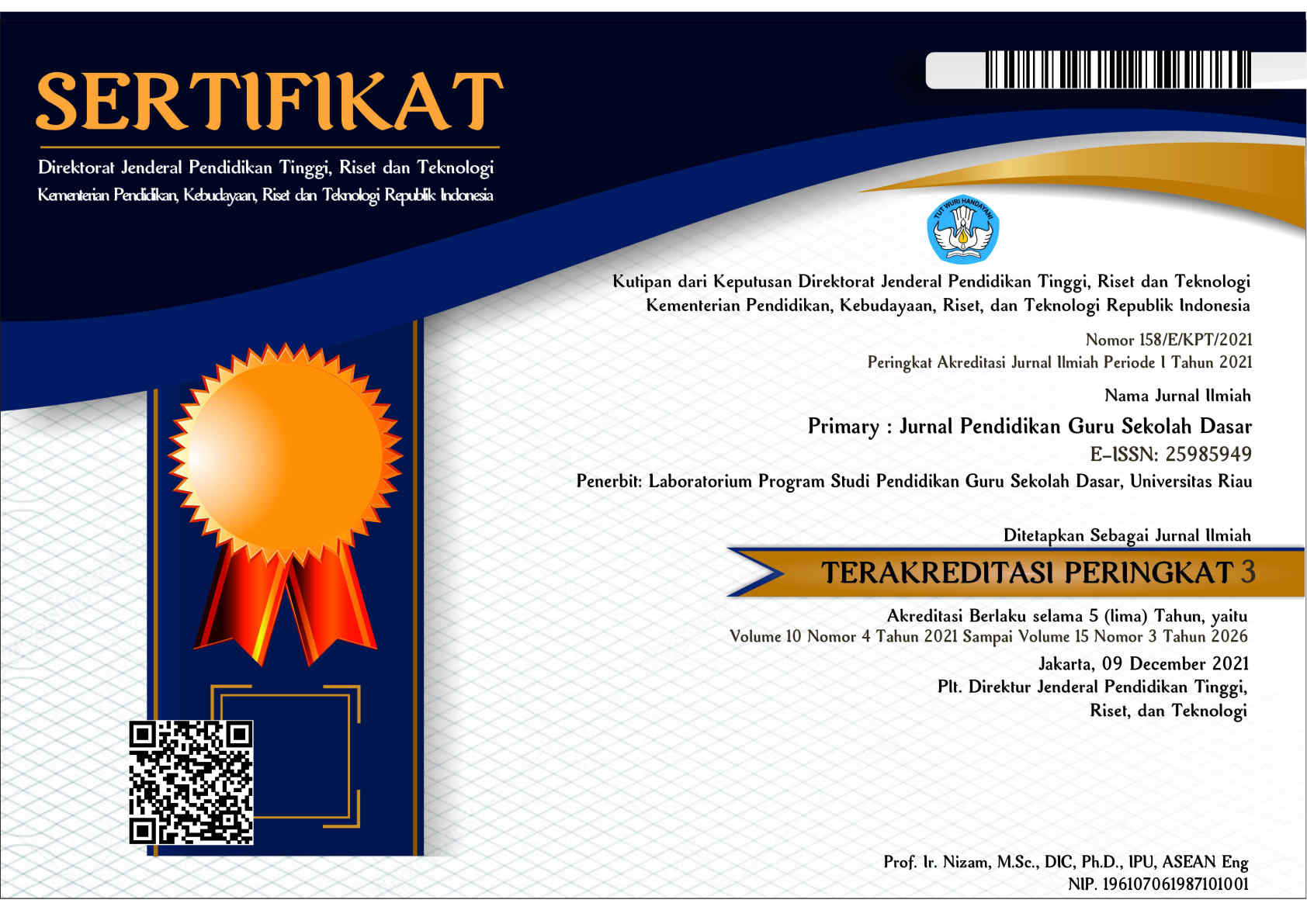PENGARUH MODEL PEMBELAJARAN CONTEXTUAL TEACHING AND LEARNING (CTL) TERHADAP HASIL BELAJAR SISWA PADA TEMA DAERAH TEMPAT TINGGALKU
Abstract
Keywords
Full Text:
PDF (Bahasa Indonesia)References
Al-Tabany., Badar, I., Trianto. (2011). Desain Pengembangan Pembelajaran Tematik. Jakarta : Prenada Media Group
Arikunto. (2010). Prosedur Penelitian. Jakarta : PT. Rineka Cipta
Aunuhrahman. (2014). Belajar dan Pembelajaran. Bandung: CV. Alfabeta
Bahri. (2011). Psikologi Belajar. Jakarta : PT. Rineka Cipta.
Buku Guru Tema 8 Daerah Tempat Tinggalku. 2017
Buku Siswa Tema 8 Daerah Tempat Tinggalku. 2017
Hadi. (2011). Metode Penelitian Pendidikan. Bandung : Alfabeta
Istirani dan Pulungan, I. (2015). Ensiklopedi Pendidikan. Medan : Media Persada
Jihad & Haris. (2018). Evaluasi Pembelajaran. Yogyakarta: Multi Persindo
Komara, E., dan Syaiful, S. (2014). Ensiklopedi Pendidikan. Medan : Media Persada
Kompri. (2015). Motivasi Pembelajaran Perspektif Guru dan Siswa. Bandung : PT Remaja Rosdakarya
Laili, H. (2016). Keefektifan pembelajaran dengan pendekata CTL Ditinjau Dari Motivasi dan Prestasi Belajar Matematika. Jurnal Pendidikan Matematika, 2(3), 101-105.
Lumban, G., & Rumiris. (2019). Efektivitas Bahan Ajar Tematik Sekolah Dasar Berbasis Budaya Lokal Melalui Penerapan Model Pembelajaran Contextual Teaching And Learning (CTL) Terhadap Aktivitas Belajar Siswa. Jurnal Guru Kita, 3(4), 95-100.
Mudjiono. (2010). Belajar dan Pembelajaran. Jakarta : PT Rineka Cipta.
Mulyasa. (2013). Model Pembelajaran CTL (Contextual Teaching and Learning). Jurnal Pengembangan dan Implementasi Kurikulum 2013. 11(1), 200-210.
Mulyono. (2011). Implementasi Model pembelajaran Contextual Teaching and Learning (CTL) Pada Standar Kompetensi Dasar Memasang Instalasi Penerangan Listrik Di SMK 7 Surabaya. Jurnal Implementasi Model Pembelajaran Contextual Teaching and Learning (CTL). 3 (2), 145-150.
Noor, J. (2017). Metodologi Penelitian. Jakarta. Kencana
Purwanto. (2017). Evaluasi Hasil Belajar. Yogyakarta : Pustaka Pelajar.
Rusman. (2013). Model-Model Pembelajaran. Jakarta : Raja Grafindo Persada.
Sadirman. (2011). Interaksi dan Motivasi Belajar Mengajar. Jakarta. PT Raja Grafindo Persada.
Sanjaya, W. (2011). Pembelajaran Dalam Implementasi Kurikulum Berbasis Kompetensi. Jakarta: Prenada Media Group.
Shoimin, A. (2016). Model Pembelajaran Inovatif Dalam Kurikulum 2013. Yogyakarta: AR-Ruzz Media.
Slameto. (2013). Belajar dan Faktor-Faktor Yang mempengaruhi Belajar. Jakarta : PT Rineka Cipta
Sofan, A. (2016). Pengembangan dan Model Pembelajaran Dalam Kurikulum 2013. Jakarta: PT Prestasi Pustakaraya.
Sudjana. (2017). Pengaruh Model Pembelajaran Student Facilitator and Explaining Terhadap Hasil Belajar Simulasi Digital. Jurnal Vokasional Teknik Elektronika & Informatika, 6 (1). 105-110.
Sudjana. (2016). Penilaian Hasil Proses Belajar Mengajar, Edisi 15, Bandung: PT Remaja Rosdakarya.
Sugiyono. (2017). Metode Penelitian Pendidikan. Bandung : Alfabeta
Sujarweni, W. (2019). Metodologi Penelitian. Yogyakarta: Pustaka Baru Press.
Susanto. (2013). Teori Belajar dan Pembelajaran di Sekolah Dasar. Jakarta : Prenada Media Group.
Trianto. (2014). Pengembangan Bahan Ajar Tematik. Jakarta : Prenada Media Group.
DOI: http://dx.doi.org/10.33578/jpfkip.v9i6.8035
Refbacks
Copyright (c) 2020 Irma Hutauruk, Rumiris Lumban Gaol, Saut Maulahe, Darinda Sofia Tanjung

This work is licensed under a Creative Commons Attribution-NonCommercial-ShareAlike 4.0 International License.
____________________________________________________________
Primary: Jurnal Pendidikan Guru Sekolah Dasar
Secretariat
Program Studi Pendidikan Guru Sekolah Dasar
Gedung B1, FKIP Universitas Riau
Kampus Bina Widya Km. 12,5 Simpang Baru Panam
Pekanbaru Riau Indonesia 28293
e-mail : primary@ejournal.unri.ac.id



